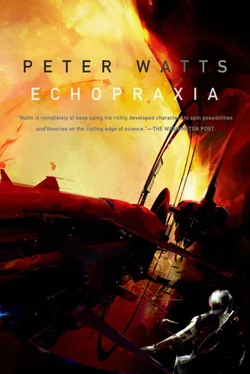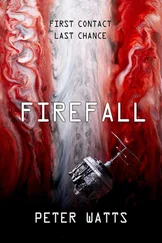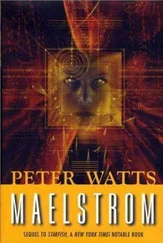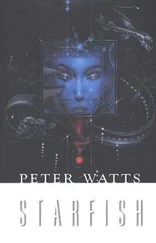Lianna shrugged. “Change your brain.”
“Then it’s not your brain anymore. It’s something else. You’re something else.”
“That’s kinda the point. Transcendence is transformation.”
He shook his head, unconvinced. “Sounds more like suicide to me.”
He felt his eyes start up under closed lids, stepped out onto that razor-thin line between dreamtime and the waking edge: just enough awareness to see the curtain, not enough to notice the man behind.
Lucid dreaming was a delicate exercise.
He sat up on the pallet, phantom legs still wearing corporeal ones like the abdomen of some half-molted insect. He looked around at furnishings that would have been spartan to anyone who hadn’t just spent two months sleeping on the desert floor: a raised sleeping pallet a couple of meters long, dipped in some softer, thicker variant of the fleshy synthetic lining the floors. An alcove in the wall, a medicine cabinet fronted with frosted glass. Another one of those washbasin pedestals, this one with a towel bar bolted to the side facing the bed: a hand towel draped over it. The cubby Luckett had tucked him into for the night, all pretty much the way it looked when he was awake.
He’d learned to launch his dreams from a platform anchored in reality. It made the return trip easier.
Brüks flexed his temporoparietal and ascended through a ceiling of polished granite (that was surmise—he’d forgotten to take note of its composition in the waking world). The monastery spread out around, then below him: dwindled from a life-size fortress to a tabletop model on a cracked gray moonscape. A fingernail moon shone bone-white overhead; everywhere else, a million stars glinted hard as ice crystals against the darkness.
He flew north.
It was minimalist magic: no rainbow bridges or talking clouds, no squadrons of aircraft piloted by tyrannosaurs. He’d long since learned not to strain the credulity of whatever mental processes indulged his presence here, critics that had lived in his head since before his dreams had even been lucid. Some inner skeptic frowned at the thought of a space-faring bicycle and dreaming eight-year-old Danny Brüks found himself stranded between the stars. Some forebrain killjoy snorted at the giddy delight of flying and suddenly he was entangled in high-tension wires, or simply ejected back into consciousness at three in the morning, spat out of sleep by his own incredulity. Even in dreams, his brain had been selling him out since before he’d had hair on his crotch. As an adult he’d had no use for them until his limited baseline learning curve had run out of waking hours, forced him to learn new techniques in his sleep lest academia’s new-and-improving generation devoured him from behind.
He could fly now at least, without thought or self-subversion. He’d learned that much through years of practice, through the induction hardware that had once guided his visions when REM started up, through the exercises that eventually let him ditch those training wheels and do it all in his own head. He could fly, into orbit and beyond and back if he wanted to. He could fly all the way to Heaven. That was where he was going now: the Northern Lights swirled in the sky directly ahead, a blue-green curtain shimmering above his destination like a Star of Bethlehem for the Holographic Age.
But no talking clouds. He’d also learned not to push it.
Now, ghostlike, he passed through Heaven’s fortifications and descended into its deepest levels. Rho languished there as she always did, alone in her cell, still wearing the paper smock and slippers she’d worn in Departures when they’d told each other it wasn’t goodbye. A cuff around her left ankle and a dozen links of corroded chain shackled her to the wall. Hair hung across her downcast face like a dark curtain.
Her face lit up, though, as he descended through the ceiling.
He settled beside her on the stone floor. “I’m sorry. I would’ve come sooner, I just—”
He stopped. No point in wasting precious REM with dreamed apologies. He tweaked the script, started again.
“You wouldn’t believe what’s happening,” he said.
“Tell me.”
“I’ve got caught up in some kind of war, I’m trapped behind enemy lines with a bunch of—really. You wouldn’t believe me.”
“Monks and zombies,” she said. “And a vampire.”
Of course she knew.
“I don’t even know how I can be here. You’d think with all this stuff happening I’d be too wired to even sit down, but—”
“You’ve been going straight for twenty-four hours.” She laid her hand on his. “Of course you’re going to crash.”
“These people don’t,” he grumbled. “I don’t think they even sleep, not all at once anyway. Different parts of their brains take—shifts, or something. Like a bunch of dolphins.”
“You’re not a dolphin, and you’re not some augmented wannabe either. You’re natural . Just the way I like it. And you know what?”
“What?”
“You’re going to keep up with them. You always do.”
Not always, he thought.
“You should come back,” he said suddenly. Somewhere far away, his fingers and toes tingled faintly.
She shook her head. “We’ve been over this.”
“Nobody’s saying you have to go back to the job. There are a million other options.”
“In here,” she told him, “there are a billion.”
He looked at her chain. He had never consciously forged those links. He’d simply found her like this. He could have changed her circumstance with a thought, of course, as he could change anything in this world—but there were always risks.
He’d learned not to push it.
“You can’t like it here,” he said quietly.
She laughed. “Why not? I didn’t put that thing on.”
“But—” His temples throbbed. He willed them to stop.
“Dan,” she said gently, “ You can keep up out there. I can’t.”
The tingling intensified in his extremities. Rho’s face wavered before him, fading to black. He couldn’t keep her together much longer. All this careful conservatism, these shackled environments that barely edged beyond the laws of physics—they only guarded against the Inner Heckler, not these unwelcome sensations intruding from outside . Headaches. Pins and needles. They distracted from his own contrivance; suddenly the whole façade was falling apart around him. “Come back soon,” his wife called through the rising static. “I’ll be waiting…”
She was gone before he could answer. He tried to construct something spectacular—the implosion of Heaven itself, a fiery inward collapse toward some ravenous singularity deep below the Canadian Shield—but he was rising too fast toward the light.
There’d been a time when he’d derided his own lack of imagination, cursed his inability to slip his shackles and just dream like everyone else, with glorious hallucinogenic abandon. Even now, sometimes, he had to remind himself: it wasn’t a failing at all. It was a strength.
Even in sleep, Dan Brüks didn’t take anything on faith.
TO HIMSELF EVERYONE IS IMMORTAL; HE MAY KNOW THAT HE IS GOING TO DIE, BUT HE CAN NEVER KNOW THAT HE IS DEAD.
—SAMUEL BUTLER
SUNSHINE STABBED HISeyes through the cell’s slotted window. His mouth was dry, his head athrob. His fingers pulsed with dull electricity. Slept on my hands, he thought, and tried to imagine how he might have actually done that as he swung his legs over the edge of the bed.
The same pins and needles flooded the soles of his feet when he planted them on the floor.
Great.
He found his way to the lav that Luckett had shown him the night before, emptied his bladder while every extremity tingled and burned. The discomfort was beginning to fade by the time he flushed; he headed off down the empty hall in search of other warm bodies, only slightly unsteady on his feet.
Читать дальше








